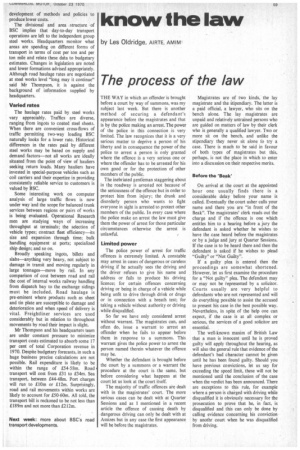know the law
Page 61

If you've noticed an error in this article please click here to report it so we can fix it.
by Les Oldridge, AIRTE, AMIM'
The process of the law
THE WAY in which an offender is brought before a court by way of summons, was my subject last week. But there is another method of securing a defendant's appearance before the magistrates and that is by the police making an arrest. The power of the police in this connection is very limited. The law recognizes that it is a very serious matter to deprive a person of his liberty and in consequence the power of the police to arrest a person is only granted where the offence is a very serious one or where the offender has to be arrested for his own good or for the protection of other members of the public.
The inebriated gentleman staggering about in the roadway is arrested not because of the seriousness of the offence but in order to protect him from injury; the drunk and disorderly person who wants to fight everyone in sight is arrested to protect other members of the public. In every case where the police make an arrest the law must give them the power of arrest for those particular circumstances otherwise the arrest is unlawful.
Limited power The police power of arrest for traffic offences is extremely limited. A constable may arrest in cases of dangerous or careless driving if he actually sees the driving and the driver refuses to give his name and address or fails to produce his driving licence: for certain offences concerning driving or being in charge of a vehicle while being unfit to drive through drink or drugs or in connection with a breath test; for taking a vehicle without authority or driving • while disqualified.
So far we have only considered arrest• without warrant. The magistrates can, and often do-, issue a warrant to arrest an offender when he fails to appear before them in response to a summons_ This warrant gives the police power to arrest the person named therein whatever the offence may be.
Whether the defendant is brought before the court by a summons or a warrant the procedure at the court is the same, but before considering what happens at the court let us look at the court itself.
The majority of traffic offences are dealt with in the magistrates' court_ The more serious cases can be dealt with at Quarter Sessions and as I mentioned in a recent article the offence of causing death by • dangerous driving can only be dealt with at Assizes but in any case the first appearance will he before the magistrates. Magistrates are of two kinds, the lay magistrate and the itipendiary. The latter is a paid official, a lawyer, who sits on the bench alone. The lay magistrates are unpaid and relatively untrained persons who are guided on matters of law by their clerk who is generally a qualified lawyer. Two or more sit on the bench, and unlike the stipendiary they never sit alone to try a case. There is much to be said in favour of both types of magistrates but this, perhaps, is not the place in which to enter into a discussion on their respective merits.
Before the 'Beak'
On arrival at the court at the appointed hour one usually finds there is a considerable delay before your name is called. Eventually the court usher calls your name and there you are "in front of the Beak". The magistrates' clerk reads out the charge and if the offence is one which entitles him to a hearing before a jury the defendant is asked whether he wishes to have the case heard before the magistrates or by a judge and jury at Quarter Sessions. If the case is to be heard there and then the defendant is asked if he wishes to plead "Guilty" or "Not Guilty".
If a guilty plea is entered then the proceedings are somewhat shortened. However, let us first examine the procedure for a "Not guilty" plea_ The defendant may or may not be represented by a solicitor. Courts usually are very helpful to defendants who are not represented and will do everything possible to assist the accused to present his case in the best possible way. Nevertheless, in spite of the help one can expect, if the case is at all complex or serious, the services of a good solicitor are essential.
The well-known maxim of British Law that a man is innocent until he is proved guilty will apply throughout the hearing, as will also the general rule that evidence of the defendant's bad character cannot be given until he has been found guilty. Should you have previous convictions, let us say for exceeding the speed limit, these will not be mentioned until the conclusion of the case when the verdict has been announced. There are exceptions to this rule, for example where a person is charged with driving while disqualified it is obviously necessary for the prosecution to prove that he, in fact, is disqualified and this can only be done by calling evidence concerning his conviction by anothr court when he was disqualified from driving.






































































































